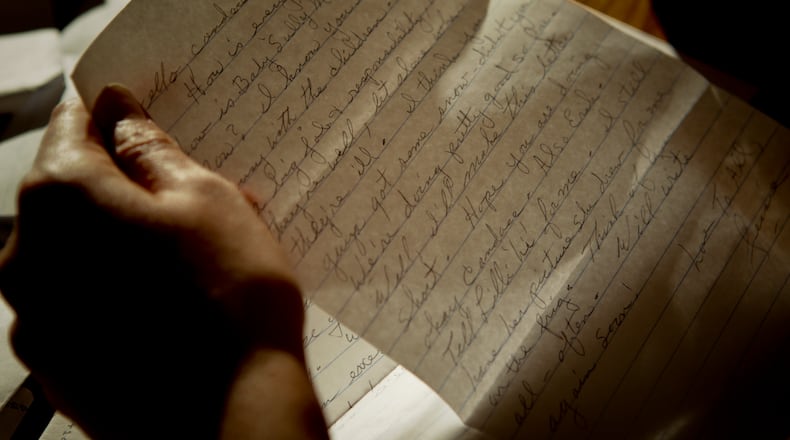Since the farm house is so big with lots of storage space, relatives have asked to leave items there for decades. The result is four, or maybe five, generations of keepsakes, paperwork, photographs, antiques and junk.
READ MORE: New Jerry W. Kinley Funeral Home opens in Springfield
Mixed in all the stuff I have found letters.
I know. I know. If we stop sorting to read them all as we found them, we’d never get the auction ready. We have to remind ourselves of this daily. We are saving the old letters and photographs to savor later.
However, sometimes I cannot resist. I like to hold some back for break time to read with my coffee.
Reading one of those handwritten letters is so much like a personal visit. The manner of wording and thoughts are so personal and individual that I feel that I’ve just sat down with this relative who passed away before I was even born. I wish I could ask questions.
The most meaningful letters to me were some written to my mother in 1965 when her own mother passed away. I found these gems in with my grandpa’s 1931 tax return. (Evidently there is such a thing as keeping financial records too long.) These were notes from my great aunts on my dad’s side of the family, from far away cousins and dear family friends.
TRENDING STORY: 2 local mayor’s courts high on latest supreme court ranking
These ladies, who had strong significant roles in my upbringing, were writing my mother to comfort her. They shared their thoughts and experiences on losing a parent. Their notes were heartfelt, brimming with memories, suggestions and often included scripture that had helped them. I found their words to be most comforting and helpful as I’ve dealt with my recent losses of my mom and dad. These letters are hugs in envelopes.
All these letter writers have now passed away themselves and I feel like these words of comfort are gifts across time to me. They are reminders that we will all go through loss in our lives. And as we go through those difficult times we must draw on our faith, and the support of friends and family to get through it.
You know, some things just never change.
RELATED: Maple tapping a sign spring isn’t far off in Clark County
Letter writing is a fine art and an endangered one. It is so easy now to make a phone call or send a quick digital message. I cannot remember the last time we got a letter in our mailbox that wasn’t part of a Christmas greeting. It used to be we got a couple of letters a week from parents, grandparents, distant friends or great aunts. For some reason, most likely the distance between us and the long times between visits, I kept those letters and now I’m so glad I was a letter-saving pack-rat. I do cherish my own collection.
Luckily my great-grandmother kept her correspondence and keepsakes in a big steamer trunk that has remained untouched for years. It is fascinating to read the thoughts of the people in those tintypes. I’m amazed at how modern their observations seem.
I re-read two letters written by my great-great-great-great-grandfather in 1860 and 1866. His garden was good that year but he bemoaned that the weather was so messed up during that spring that he had no fruit on his trees. Yeah, grandpa, I understand. That still happens.
This personal connection is why old letters are so valuable to historical societies and museums. They do make history real to a person researching a time period or event. These are eye-witness observations and sometimes reveal details history forgot to record.
If you find any old letters as you sort through your own stuff, don’t throw them away. If you or your relatives have no storage space, consider digitizing these letters. You might want to scan and save them electronically anyway so you can share them with multiple relatives. That is what we plan on doing with this collection — after the auction and house sale are done.
Local historical societies may want letters with historical significance or local links. Letters with details of floods, blizzards, tornadoes, immigration, wars, train wrecks, public figures or other significant events outside of the family might be helpful to historians. Ask.
Meanwhile take some time to put your own observations on paper in letters or maybe a journal. Your great-grand kids just might appreciate that in 2018 we navigated through the same kind of challenges they face in their lives 100 years later. Knowing how we got through a life event might be helpful to them.
After all, some things never change.
About the Author
